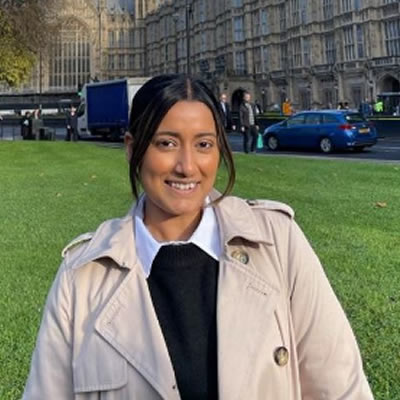Uncovering the Full Picture: How we influenced policymakers to publish the 12-Hour Time of Arrival Data

By Pooja Kumari, Policy and Public Affairs Manager
In February 2023 the Government and NHS England published its Delivery Plan for the Recovery of Urgent and Emergency Care Service, announcing that the number of patients waiting 12 hours or more from their time of arrival will finally be published in April. For nearly a decade now, the College has campaigned to get this important dataset published on a regular basis. Although this journey has pre-dated my time at the College, the Policy and Public Affairs team has worked closely with our College Presidents to lobby for this important change. In this blog, I will outline the steps we took to successfully influence NHS England and the Government to publish the 12 hour data.
NHS England has long published the number of patients who wait 12 hours from the decision made to admit (DTA) the patient. We know that this is misleading for a number of reasons as it does not capture the true extent of the delays experienced by the patient. Beginning in 2019, the Clinical Review of Standards aimed to establish a new set of measures that would be better for both patients and clinicians. The College played an important role in calling for the 12-hour metric to be collected from the time of arrival (ToA) to the ED within the bundle of proposed metrics as this would better demonstrate the gravity of delays experienced by patients. It also brings performance measurement in line with the rest of the devolved nations.
Building the evidence base
Initially, the only source of data capturing the discrepancy between the DTA and ToA 12-hour data was the Hospital Episode Statistics (HES). HES data provided an annual aggregate of the number of patients waiting 12 hours or more from ToA, which effectively gave us just one moment each year to raise awareness of this issue, limiting our ability to lobby for change.
To land this issue on the policy agenda, we decided to take a different approach. In 2022, we submitted Freedom of Information (FOI) requests to every single trust in England and to gather their ToA data by month for 2021. We published these results in our Tip of the Iceberg report. This was the first time that such a comprehensive and detailed dataset had been made available. We were able to show the wide degree of variation in the time of arrival and decision to admit figures across different Trusts.
At this point, no one had provided us with a compelling reason why this data shouldn’t be published. We used the intelligence gathered in our Tip of the Iceberg report to ask NHS England to publish this data, giving them a deadline of the 1st of July 2022. When we didn’t hear back from NHS England, we submitted a complaint to the Office for the Statistics Regulation (OSR). It was in the interests of every patient to publish this data as it is important that the public have faith over the accuracy of the statistics presented by NHS England. The OSR wrote to NHS England asking them to take steps to ensure this important dataset is published monthly, in line with the rest of the devolved nations.
We appreciated this intervention but recognised there was much to be done. The next step was to ensure that we got our hands on this data routinely and so the College submitted regular FOI requests to NHS Digital to access the data on a monthly basis.
Lobbying policymakers
In summer 2022, we worked closely with MPs to table a debate in the House of Commons on Waiting Times for Ambulance and Emergency Services. The debate discussed this dataset as an immediate, cost-effective way of improving the performance of the system and supporting better patient outcomes. The House of Lords Public Services Committee’s inquiry into emergency services concluded the need for this data to be published imminently. Our President, Dr Adrian Boyle, gave evidence to this committee in person; parliamentarians were appalled to see the glaring discrepancies between DTA and ToA datasets. Influencing other organisations – especially influential parliamentary groups – to lobby for the same cause as us is important. Collective action is effective in driving policy change.
Over Christmas our President and Vice Presidents made a time critical intervention and publicly discussed the dire state of emergency care. Their efforts landed us extensive media coverage along with an invitation to a number of high-profile meetings. By shaping the press agenda, we were able to frame publishing the 12-hour data as a desirable quick win to policymakers. This time our efforts paid off.
A collective effort
Thank you to all those who have supported our efforts thus far, and we look forward to continued collaboration in the future. We extend a special thanks to our current President, Dr Adrian Boyle and former President Dr Katherine Henderson. Together, they have been the driving force behind our advocacy work. I also want to acknowledge the important role played by our former Presidents. Firstly, Dr Taj Hassan, who laid the foundation for our work on this campaign and the late Dr Cliff Mann, who advocated for this important change during his time as National Clinical Advisor for Accident and Emergency Care at NHS England.
Our Policy and Public Affairs, and Communications teams have been instrumental in bringing this issue to the forefront of policymakers’ attention. From securing us headline after headline using our FOI data to writing effective briefings to place this issue on the policy agenda.
While we celebrate this achievement, our advocacy work is far from over. This data is just the first step towards improving patient safety and ensuring timely access to emergency care. We will continue to campaign to #ResuscitateEmergencyCare to ensure better outcomes for every emergency patient.



1 Comment
Sistem Informasi · July 1, 2023 at 6:10 pm
What can influence policy makers? and why do patients have to wait up to 12 hours?